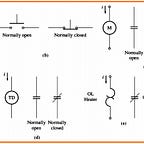Difference between cell splitting and cell sectoring — The Engineering Knowledge
Hello, readers welcome to the new post. Today we will discuss the Difference between cell splitting and cell sectoring. The technique that helps to divide the cells into subparts of a small size is called cell splitting. The main cell that is divided is known as a macro cell and smaller cells are called microcells. While cell sectoring is a technique that enhances the capacity or range. In this method, the size of cells remains the same and reduces the co-channel reuse ratio D/R to decrease the cluster size
In this post, we will cover the different points to find the differences between cell splitting and cell sectoring. So let’s get started.
Difference between cell splitting and cell sectoring
What is Cell Splitting
- In this method area of the cell of the cellular system is converted into more cell areas and that divided area has its own base station and transceiver.
- Through this process cell having larger users can be converted into many microcells that have a small size than the parent cell
- So for the operation of that new cell, there is a need of a new base station to provide the services to users in this new cell
- The splitting of cells enhances the channel capacity and easy to access and handle many calls with that frequency use can be done easily
What is Cell sectoring?
- It is a process through which a one-direction antenna is converted into a multi-directional antenna to handle the larger users in the cell. With that, another technique is to install more base stations in cells called cell sectoring.
- Each cell is parted into radial sectors having a directional base station antenna that enhances the operation of the system to handle the interference caused by the co-channel.
- This technique is used for macro-cellular systems. In real numerous sectored antennas are positioned on the one microwave tower that is placed in the center of the cell and different other antennas are connected to cover the circle of the cell.
- Through this process number of cells that configure the certain cluster decreases and the distance which parted the co-channel also decreases.
- So cell sectoring is the process of decrement of co-channel interference to enhance the capacity of the cellular network.
Cell Splitting Vs Cell Sectoring
- The technique in which a cell is divided in sub-parts is called cell splitting and in the cell, sectoring cell is configured into numerous sectors and each sector has its own base station
- Cell sectoring increases the number of calls and cell sectoring decreases the efficiency of trunking by dividing the channel groups into small
- The dia of the cell decreases in cell splitting and has the same co-channel reuse ratio and in cell sectoring, there is no change of cell radius in spite of co-channel reuse radio decreased
Cell Sectoring Advantages
- It has a good S/I ratio
- It has more space for channel allocation
- It decreases the size of the cluster
- We have a larger capacity
- Less interference
Cell Sectoring Disadvantage
- It has larger handoffs
- Less traffic
- It has less trunk efficiency
- The number of antennas used for base stations increases
That is all about the Difference between cell splitting and cell sectoring all details has explained if you have any queries ask in the comments. Thanks for reading. See you in the coming tutorial
Author: Henry
http://www.theengineeringknowledge.com
I am a professional engineer and graduate from a reputed engineering university also have experience of working as an engineer in different famous industries. I am also a technical content writer my hobby is to explore new things and share with the world. Through this platform, I am also sharing my professional and technical knowledge to engineering students.
Originally published at https://www.theengineeringknowledge.com on October 8, 2022.
